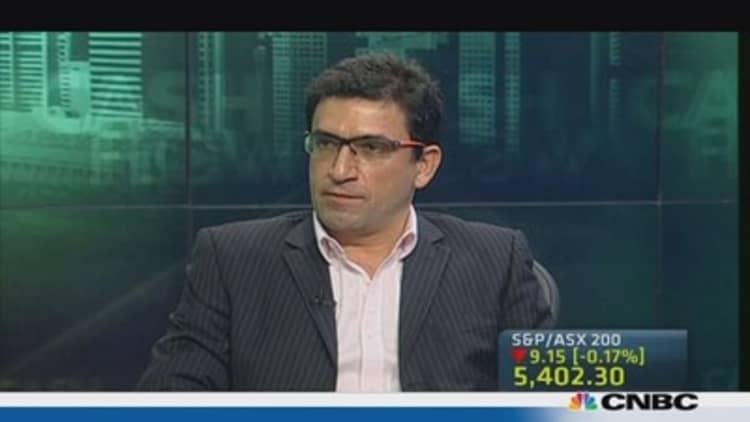
Japan's latest batch of economic data and corporate earnings paint a slowly brightening picture, but shares can't seem to gain any traction.
"The valuations are very modest in our view and if you look at corporate balance sheets, (they) are very, very healthy in Japan. Anything from a bottom up perspective is looking fairly positive," said Amir Anvarzadeh, director of Japan equities at BGC Securities.
"But unfortunately right now, we're not really in a bottom up kind of market," he added. "Unfortunately the market is very macro driven."
(Read more: A good start to the year for Japan's economy)
On the surface, the macro-economic data appear positive, with a strong start to the year. Japan's retail sales rose 4.4 percent in January from a year earlier, above analyst expectations for a 3.8 percent rise and marking a sixth straight month of gains.
Meanwhile, household spending rose 1.1 percent on year in January, well above expectations for a 0.2 percent gain, while industrial output rose 4 percent from a month earlier, also beating forecasts.

But why isn't that enough to push up stocks? For one, analysts are warily watching for the planned increase to the consumption tax to eight percent from five percent in April, which is likely to dent corporate earnings and consumer spending. Many expect the Bank of Japan will step in with further easing measures afterward.
"There's some fear of distortion coming from the tax hike where we're seeing a front loading of consumption happening, particularly for big ticket items like cars and refrigerators," Anvarzadeh told CNBC.
"Any earnings growth that we're going to see in the current quarter is going to be seen as kind of flattered," he said.
(Read more: Japan's tax hike won't hit all retailers equally)
"What people really want to see is the quarter after. What kind of drop off are we going to see in end demand and how bad will it be? Until then, I think the jury is out on where the Nikkei is going to go in the short term," he said. "The concerns are that the economic growth that we've seen, that the momentum is just not strong enough going past the sales tax hike and the BOJ would need to become more aggressive with the monetary policy."
Others are concerned that Abenomics, or the around one-year-old plan from Japanese Prime Minister Shinzo Abe to kick-start Japan's long-moribund economy, just isn't living up to its hype.
(Read more: Why you should be patient with Abenomics)
After the stock market tacked on more than 50 percent last year, "people are sort of waiting for the substance to come on," said Chong Yoon-Chou, investment director at Aberdeen Asset Manager. "There's a lot of debate whether Abenomics is actually doing its trick other than quantitative easing."
The "first arrow" of Abenomics was aggressive easing from the Bank of Japan, which weakened the yen. It was followed by a "second arrow" of ambitious government spending, but the "third arrow" of structural reforms remains elusive.
Chong is doubtful that the quantitative easing had much direct impact on the economy. While the yen weakness flattered corporate earnings, "the impact is actually not direct because Japanese corporates have already rebased their production elsewhere," he told CNBC.
It's possible the weaker yen didn't even serve its traditional purpose of making Japan's exports more competitive.
"A weaker currency hasn't translated into the expected export gains," with Japan's exporters actually continuing to lose market share, Marcel Thieliant, an economist at Capital Economics, said in a note.
(Read more: Can Japan's rally continue without a third arrow?)
"Companies chose not to cut export prices in foreign currency terms, preferring to reap benefits in terms of surging yen revenues rather than higher volumes and a rising market share," he said.
Another factor likely to limit the chances of a sustained demand pickup in Japan: raising workers' wages, a key plank of Abenomics, isn't materializing, posing a "significant threat" to economic recovery, Thielant said.
(Read more: Does Sony's revamp signal a sea change for Japan Inc?)
To be sure, not all of the signs are worrying. Chong noted property prices are increasing.
"That usually is a gauge of animal spirits," Chong said. "One can debate about the validity of Abenomics, but if they can get the animal spirits up in Japan, things can happen."
—By CNBC.Com's Leslie Shaffer; Follow her on Twitter @LeslieShaffer1

